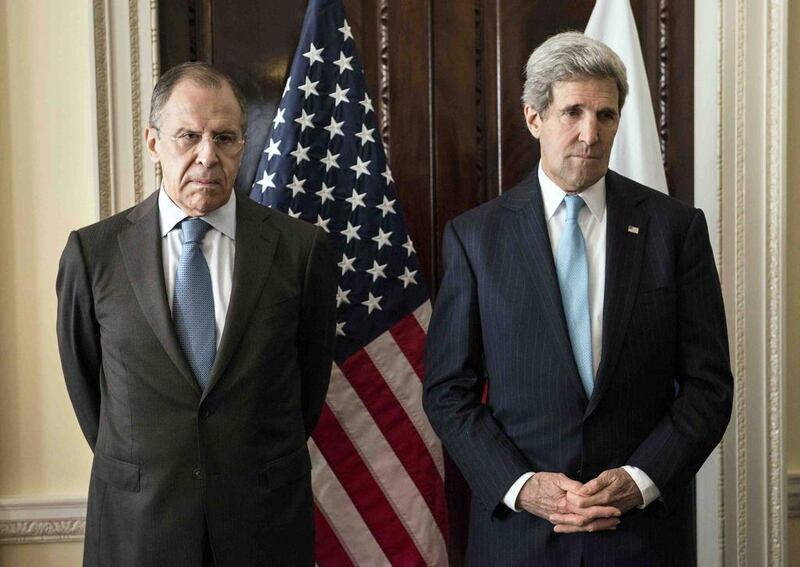LONDON // Washington and the EU will not recognise the outcome of Sunday’s referendum in Crimea on seceding from Ukraine, the US secretary of state John Kerry said.
Mr Kerry spoke after six hours of talks on Friday with Russia’s foreign minister, Sergey Lavrov.
Mr Lavrov acknowledged there was no “common vision” over the crisis in Ukraine.
The vote in Crimea — Ukraine’s strategic Black Sea peninsula of 2 million people — is widely expected to back secession and possibly lead to annexation with Russia at some point. The new government in Kiev believes the vote is illegal, but Moscow says it does not recognise the new government as legitimate.
The US and the European Union say the Crimean vote violates Ukraine’s constitution and international law. If Crimea votes to secede, the US and the EU plan to slap sanctions as early as Monday on Russian officials and businesses accused of escalating the crisis and undermining Ukraine’s new government.
The EU has drawn up a list of 120-130 Russians who could be hit with travel bans and asset freezes for their actions over Crimea, European diplomats said, but the final register of names will only be decided on Sunday.
German tabloid newspaper Bild earlier reported that the CEOs of Russia’s two biggest companies — Gazprom’s Alexei Miller and Igor Sechin of Rosneft — would be on the final list, but the diplomats dismissed the report.
“It’s not yet agreed,” a diplomat said.
Mr Kerry said Friday he had put forward several ideas on how to respect Ukraine’s sovereignty and address Russian concerns in the talks in London, but that Mr Lavrov made clear that the Russian president, Vladimir Putin, would not take any decisions until after Sunday’s vote.
Mr Lavrov reaffirmed that Russia will “respect the results of the referendum” in Crimea and said sanctions would harm relations.
“Our partners also realise that sanctions are counterproductive,” he said.
The showdown between Russia and the West has been cast as a struggle for the future of Ukraine. Much of western Ukraine favours ties with the EU, while many in eastern Ukraine have closer economic and traditional ties to Russia. Mr Putin has worked for months to press Ukraine back into Russia’s political and economic orbit.
While the Russian foreign ministry engaged in more sabre-rattling Friday by warning that it reserves the right to intervene in eastern Ukraine in defence of ethnic Russians who it claims are under threat, Mr Lavrov denied any plans to send troops there.
“Russia doesn’t and can’t have any plans to invade southeastern regions of Ukraine.”
Clashes overnight on Thursday in the eastern city of Donetsk killed at least one person and injured 29. The clashes broke out when a hostile pro-Russian crowd confronted pro-government supporters.
Russia has sent thousands of troops to its long border with Ukraine, a move that US officials have called an intimidation tactic cloaked as military exercises. The Russian drills announced on Thursday included large artillery exercises involving 8,500 soldiers in the Rostov border region alone.
Western officials have asked Russia to start diplomatic talks with Kiev to de-escalate tensions but Russia says that government illegally drove Ukraine’s pro-Russian president from power.
British prime minister David Cameron underlined the threat of sanctions.
“We want to see Ukrainians and the Russians talking to each other. And if they don’t, then there are going to have to be consequences,” Mr Cameron told Mr Kerry in a separate meeting on Friday in London.
* Associated Press with additional reporting by Reuters





